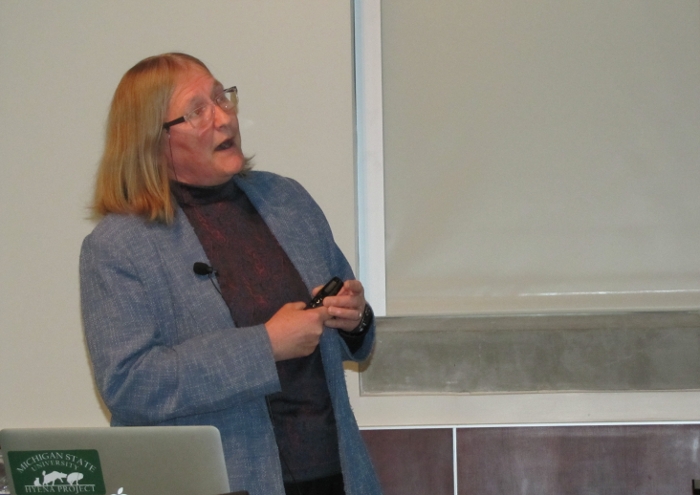NIMBioS Seminar Series
In conjunction with the interdisciplinary activities of the National Institute for Mathematical and Biological Synthesis (NIMBioS), a seminar series on topics in mathematical biology will be hosted at NIMBioS every other Tuesday at 3:30 p.m. (unless otherwise noted) in the Hallam Auditorium, Room 206, Claxton Building, 1122 Volunteer Blvd. Seminar speakers will focus on their research initiatives at the interface of mathematics and many areas of the life sciences. Light refreshments will be served in the Auditorium beginning 30 minutes before each talk. Faculty and students from across the UT community are welcome to join us.
Time/Date: Tuesday, February 18, 2014, 3:30 p.m.*
Location:
Room 206, Claxton Building, 1122 Volunteer Blvd.
Speaker:
Dr. Kay Holekamp, Distinguished Professor of Zoology, Michigan State Univ.
Topic:
The Evolution of Intelligence
Abstract:
Despite huge metabolic costs of neural tissue, some mammals and birds exhibit relatively large brain:body ratios and relatively sophisticated cognitive abilities. However, it is not clear whether big brains and great intelligence have generally evolved to cope with social complexity, complexity in the physical environment, neither or both. Primatologists have claimed that non-primate animals rarely form aggregations that impose rigorous cognitive demands and that their evolutionary success seldom depends on intelligence. They have therefore concluded that non-primate animals have no need to solve social problems that require knowledge of kinship, rank, or past history of give-and-take, as do many primates. Here I evaluate this assertion in light of recent data from non-primate mammals, focusing in particular on mammalian carnivores. It appears that that there has been remarkable convergence between primates and non-primate mammals with respect to the selection pressures, particularly social complexity, favoring the evolution of intelligence. However, recent data also suggest that the evolution of brains and behavioral flexibility has been considerably less constrained in primates than in mammalian carnivores. Recent work suggests that both social and non-social variables shape brain evolution, as do phylogenetic relationships and recent history.
*Join us for refreshments at 3 p.m. in the Auditorium.
Seminar Flyer (pdf)
For more information about this and other NIMBioS Seminars, visit /seminars.

NIMBioS
1122 Volunteer Blvd., Suite 106
University of Tennessee
Knoxville,
TN 37996-3410
PH: (865) 974-9334
FAX: (865) 974-9461
Contact NIMBioS



